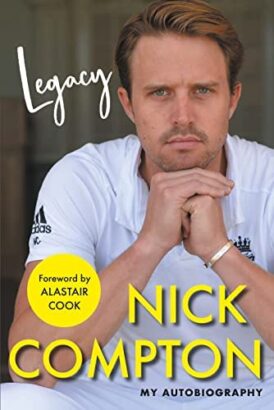Legacy
Martin Chandler |Published: 2023
Pages: 310
Author: Compton, Nick
Publisher: Allen & Unwin
Rating: 4 stars

One book I have always wanted to read is one I strongly suspect will never see the light of day, an autobiography from Richard Hutton. I did wonder, a few years ago, whether the same issues might usefully be explored by Nick Compton, but then he wasn’t a man I ever foresaw writing a book. How wrong I was on that one.
The interest in Richard Hutton, predictably, comes from an interest in the pressures that come with having a famous father or, in his case, a legendary one. Nick Compton is a generation down from Richard Hutton, but his grandfather, Denis Compton, is just as much a legend as Richard’s father, Len Hutton.
Richard Hutton was an all-rounder who did well in five Tests for England. Nick Compton had two runs in the England side as a specialist batsman without, over 16 Tests, ever making a place his own. His impact was less than it might have been because all of his better performances, including both his centuries and both half centuries came overseas. To add to the parallels a teammate of Compton’s at Middlesex was Ben Hutton, Richard’s son, six years Compton’s senior and his county captain in 2005 and 2006 – the pair put on 127 for the second wicket in Compton’s first Championship match.
Perhaps surprisingly Ben Hutton gets few mentions in Legacy, but the second chapter of the book is titled Grandad, and memories and thoughts of Denis crop up with the sort of frequency you would expect. The weight of expectation that his surname carried was something Compton was clearly conscious of but, gratifyingly, it is something that he seems to have taken pride in rather than suffered under.
But in truth there were plenty of troubles along the way for Compton. It is not something that I ever recall being conscious of in his playing days, but he has had issues with his mental health throughout his life. He doesn’t hold back when discussing those, their effect on his life and relationships and the constant battles which, at times, sound like they were for his very survival.
The Compton that Compton describes does not sound like a particularly pleasant individual, but at same time there is much evidence to support his contention that the character he often portrayed to the outside world was not the same one that was inside his head. His comments on how he got on with fellow South African Kevin Pietersen are of particular interest.
One thing that is certain is that Nick Compton has not had an easy life. There are many reasons for that, all of which are laid bare within the pages of Legacy and should, I would suggest, make all of us who read it realise that the problems he has were inevitable, so much so that my respect for him increased steadily as I read through his life story. I can see why at times he felt great disappointment and that the life was being squeezed out of him, and in truth it is a credit to him that he achieved what he did in the game.
And what of the future? Compton is, at 40, still a young man, and he has embarked on a career as a photographer, an interest he has had since he was a child. It doesn’t strike me as the easiest way to make a living nor the most stable, but I wish him every success. He certainly deserves a period of tranquility in his life.
As to whether his autobiography is worth investing in shall we just say that I opened it after breakfast on a Saturday and by teatime I had finished it. It is certainly a compelling read, and for those of us who lack any conspicuous playing ability the idea of what life might have involved if we had have some talent it is a sobering one.
I do have one criticism of Legacy, and that is a predictable one. The book is, and this is not in any way the criticism, a chronological journey through Compton’s life and cricket career, yet there is no sort of statistical appendix at all. In a book like this one the absence of an index I can understand, even if I still feel it should have one, but a comprehensive statistical summary would be a huge help to those who do not subscribe to Cricketarchive.
And finally, there is one point that I had hoped the book might clear up for me. This is strictly one for bibliophiles, but hopefully Compton himself or someone who knows the answer to this one will be able to enlighten me. There have been a number of biographies of Denis Compton over the years, and in 1989 Denis Compton: Cricketing Genius was published to coincide with the launch of The Denis Compton Trust.
West’s book appeared in a limited edition of 500 copies, all individually numbered and signed by two Comptons, Richard and Nicholas – this must make Nick Compton, who would have been six at the time, the youngest man to have signed a limited edition book, or is it him, as the signature doesn’t look like that of any six year old I have ever encountered?







Leave a comment